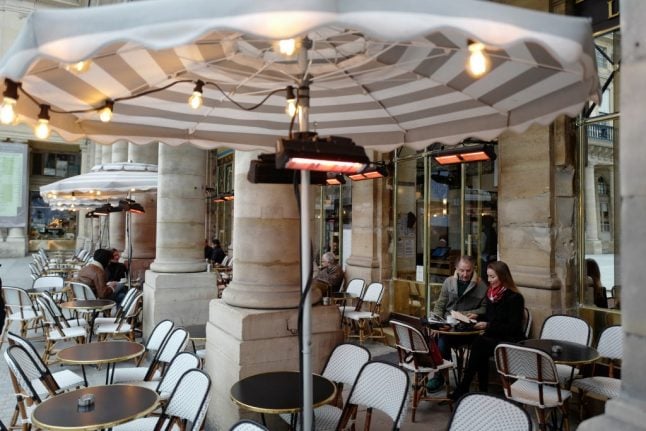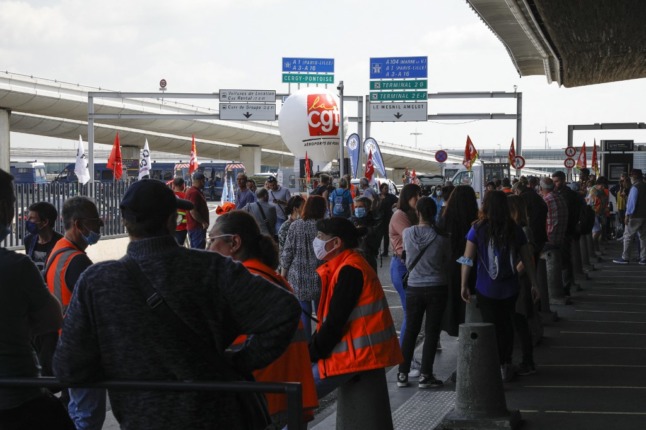On a chilly January evening the outdoor terraces of Paris' cafés and bars were nonetheless buzzing with people.
Hanging over the tables were orange lamps throwing out heat, making sitting outside not only possible, but just as comfortable as sitting inside.
But the days of heated terraces could be nearing an end as green campaigners try again to have the lamps – major consumers of energy – banned.
“Parisians are très terrasse (very fond of terraces), said Dominic Dettomme, owner of Le Jaurès café in Paris' 19th arrondissement.
“They love eating and drinking outside during the winter.”
But several French cities – Paris included – are in the process of deciding whether to ban heating lamps from all cafés and restaurants.
READ ALSO Elbows in: An essential guide to Paris café terrace etiquette

About 60 percent of Parisian cafés offer heated terraces. Photo: AFP
“We would lose between 30 and 40 percent of our usual turnover,” Dettomme said, expressing a worry that has been widely echoed by the French restaurant businesses.
The national union representing hotels, restaurants and cafés (Synhorcat) has long warned that a ban of terrace heaters could have disastrous consequences for the many restaurants and cafés that depend on them.
In Paris, 60 percent of cafés have terrace heaters, a union representative told Le Parisien.
In an interview with Le Monde, one owner claimed the terrace generated 80 percent of his restaurant’s revenue.
Synhorcat puts the number at around 20 percent on average.
Greener cities
Those pushing for a ban say it would be a big step in the transitioning into greener, less energy-aggressive cities.
“Terrace heaters are an example of how mismanaged energy can have a colossal [negative] impact on the environment, yet be accepted by everyone,” Thierry Salomon told Le Monde.
Salomon is the founder of négaWatt, an association working on energy transition.
According to one of their studies, a medium sized terrace consumes on average as much energy as nine families in the winter.
But that’s without the heating. Add five gas braziers, and a terrace measuring 75 m2 would according to the study emit 13,7 tonnes of carbon dioxide. That equals the emission level of “a new car circling the earth three times (40,000 km),” according to Le Monde.
READ ALSO: How France's new green laws could affect your energy bills
Terraces became increasingly popular the last 30 years, according to Dettomme. After smoking inside restaurants and cafes was banned in 2006, they became indispensable.
“[The smoking ban] was already a tough blow for us,” the restaurant owner said.
“Luckily we could install heating lamps so that smokers could relax with a cigarette without being a nuisance to others.”
Fourth time a charm?
Rennes is currently the only French city to have successfully banned terrace heaters.
In Paris, the French Greens (EELV) have tried several times to get terrace heaters banned, first in 2007, then in 2008 and again in 2011.
In 2011 the ban wen't through, but the Paris Legal Tribunal decided to scrap it after having conferred with the Synhorcat union.
On December 12th 2019, the Greens tried again.
“We can't wait until 2022 to end this heresy of heating up outdoor spaces, it's not possible,” Jacques Boutault, EELV Mayor of the 2nd arrondissement in Paris, told Le Monde.
“Paris is seen as a climate world champion. The city needs to prove it,” he said.
READ ALSO: Things you should never do when dining in France

The terraces have become more popular in the years since smoking inside restaurants was forbidden. Photo: AFP
But for café owners like Dettomme – already struggling with a drop in business since the transport strikes – that argument cut little ice.
“I don't think a few heating lamps in Paris pollute more than all the huge boats that cross international waters on a daily basis,” he said.



 Please whitelist us to continue reading.
Please whitelist us to continue reading.
Member comments